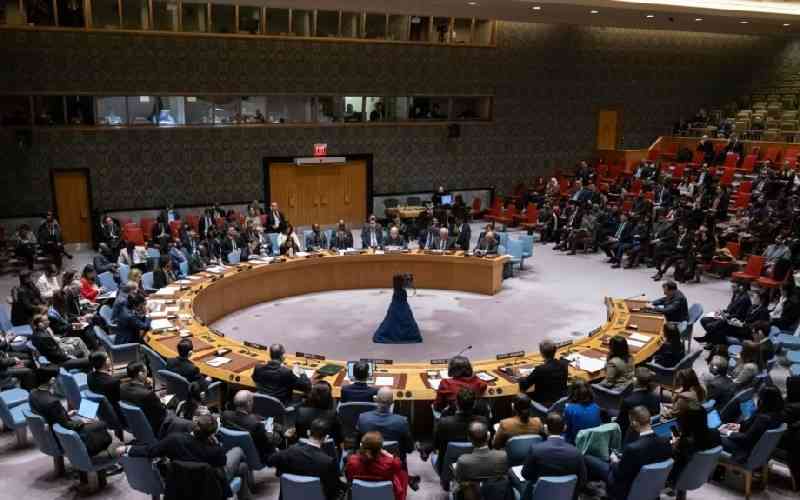The United Nations Security Council is this month expected to renew the authorisation for international flotilla on naval forces to continue carrying out anti -piracy operations off the vast Somalia coastline.
It is now over a decade since the first resolution was passed in 2008 to respond to piracy and robbery against humanitarian and commercial ships in the region.
At the time, piracy was considered a major threat to both local and global peace and security.
Since then, and especially since 2013, the number of attacks and hijackings has dropped.
International Transport Federation (ITF) Ship Inspector, Ms Betty Makenna based at the Port of Mombasa termed the proposal to extend the naval patrols as a good move adding that it will help contain piracy.
'' We can safely say that the shipping lanes that connect Mombasa Port which is gateway to the whole of East Africa region are getting safer as a result of patrols by the international navies,'' Makena said.
She said that there has been a lull in hijacks and attacks where some local seafarers have fallen into the hands of pirates who normaly demand huge ransoms before releasing those in their captivity.
Speaking separately in Mombasa, Seafarers Union of Kenya (SUK) Secretary General, Mr Steve Owaki welcomed the move adding that piracy had not been completely wiped out along the Somali Coastline.
'' Somali as a country still continues to face many challenges on land. If these challengers can be tackled, then piracy will be won easily,'' Owaki said.
Owaki said that at the height of piracy attacks, Kenya too suffered its fair share as vessels calling at the Port of Mombasa had to use longer routes to by-pass the critical sea lanes of Somali.
'' There were often delays in arrivals of ships here and in the long run cost implications went a bit high,'' he said.
Recent incidents have however raised concerns over the long-term sustainability of counter-piracy measures and whether enough is being done on land to increase the resilience of Somali communities and prevent a resurgence of piracy.
Maritime reports indicate that in most recent attack on October 16, four men attempted to board the bulk carrier MV KSL Sydney around 340 nautical miles (630km) off the coast of Mogadishu, opening fire on the ship.
The pirates aborted the attack after private security guards on board returned fire.
The European Union Naval Force, as part of Operation Atalanta, tracked down and destroyed a whaler ship believed to have been that of the attackers.
Stay informed. Subscribe to our newsletter
This is only the second piracy attack off the coast of Somalia reported this year, which is dramatically down from the 160 piracy incidents reported during the height of the problem in 2011.
The long-term success of counter-piracymeasures depends on a stable and unified Somali state.
The attack’s failure shows that current counter-piracy tactics on board vessels, prescribed by the latest iteration of Best Management Practices, remain effective at preventing pirates from boarding and capturing vessels.
The aim of these best practices is to address the vulnerabilities often exploited by pirates, thereby significantly increasing the risks for pirates.
The recent UN secretary-general’s report on piracy and armed robbery off Somalia’s coast attributes the low number of attacks to successful global collaboration and the ongoing work of regional organisations like the Contact Group on Piracy off the Coast of Somalia.
The report also cites the continued enforcement measures of international naval forces, and the extensive military, naval and donor support of the international community.
Navies, either in coordination with the European Union Naval Force and the Combined Maritime Forces, or deployed outside of them such as South Africa’s Operation Copper, help deter and disrupt pirate activities.
 The Standard Group Plc is a
multi-media organization with investments in media platforms spanning newspaper
print operations, television, radio broadcasting, digital and online services. The
Standard Group is recognized as a leading multi-media house in Kenya with a key
influence in matters of national and international interest.
The Standard Group Plc is a
multi-media organization with investments in media platforms spanning newspaper
print operations, television, radio broadcasting, digital and online services. The
Standard Group is recognized as a leading multi-media house in Kenya with a key
influence in matters of national and international interest.
 The Standard Group Plc is a
multi-media organization with investments in media platforms spanning newspaper
print operations, television, radio broadcasting, digital and online services. The
Standard Group is recognized as a leading multi-media house in Kenya with a key
influence in matters of national and international interest.
The Standard Group Plc is a
multi-media organization with investments in media platforms spanning newspaper
print operations, television, radio broadcasting, digital and online services. The
Standard Group is recognized as a leading multi-media house in Kenya with a key
influence in matters of national and international interest.








